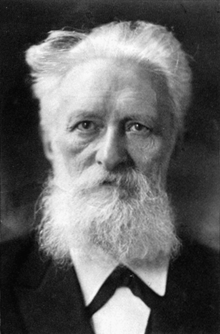Rudolf Christoph Eucken
Rudolf Christoph Eucken | |
|---|---|
 | |
| Nationality | German |
| Notable awards | Nobel Prize in Literature 1908 |
Rudolf Christoph Eucken (January 5, 1846—September 15, 1926) was a German philosopher, and the winner of the 1908 Nobel Prize for Literature.
Biography
He was born in Aurich, Hanover (now Germany), and studied at Göttingen University and Berlin University. In 1871, after five years working as a school teacher, he was appointed Professor of Philosophy at the University of Basel, Switzerland. He stayed there until 1874 when he took up a similar position at the University of Jena, Germany in 1874. He stayed there until he retired in 1920. From 1913-1914 he served as guest lecturer at New York University. He married in 1882 and had a daughter and two sons. His son Walter Eucken became a famous founder of neoliberal thought in economics.
Eucken died in Jena at the age of 80.
His philosophy was based around human experience, maintaining that humans have souls, and that they are therefore at the junction between nature and spirit. He believed that people should overcome their non-spiritual nature by continuous efforts to achieve a spiritual life. He called this Ethical activism.
It seems as if man could never escape from himself, and yet, when shut in to the monotony of his own sphere, he is overwhelmed with a sense of emptiness. The only remedy here is radically to alter the conception of man himself, to distinguish within him the narrower and the larger life, the life that is straitened and finite and can never transcend itself, and an infinite life through which he enjoys communion with the immensity and the truth of the universe. Can man rise to this spiritual level? On the possibility of his doing so rests all our hope of supplying any meaning or value to life (R. C. Eucken, Der Sinn und Wert des Lebens, p. 81).
Major works
He was a prolific writer; his best-known works are:
- Die Lebensanschauungen der großen Denker (1890) (The Problem of Human Life as Viewed by the Great Thinkers)
- Der Kampf um einen geistigen Lebensinhalt (1896) (The Struggle for a Spiritual Content of Life),
- Der Wahrheitsgehalt der Religion (1901) (The Truth of Religion),
- Grundlinien einer neuen Lebensanschauung (1907) (Life's Basis and Life's Ideal: The Fundamentals of a New Philosophy of Life),
- Der Sinn und Wert des Lebens (1908) (The Meaning and Value of Life)
- Geistige Strömungen der Gegenwart (1908) (Main Currents of Modern Thought)
- Können wir noch Christen sein? (1911) (Can We Still Be Christians?).
- Present Day Ethics in their Relation to the Spiritual Life (1913) (Deem Lectures given at New York University)
- Der Sozialismus und seine Lebensgestaltung (1920) (Socialism: an Analysis)
He delivered lectures in England in 1911 and spent six months lecturing at Harvard University and elsewhere in the United States in 1912–1913.
External links
- Eucken, Rudolf Christoph at www.nobel-winners.com
- Rudolph Eucken : a philosophy of life at Project Gutenberg (By Abel J. Jones)
